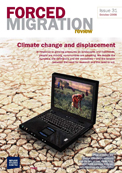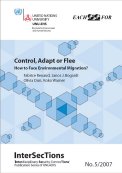Cara Nine of the University College Cork recently submitted the paper “Ecological Refugees, State Borders, and the Lockean Proviso” to the Journal of Applied Philosophy. In this essay she expounds on the term “ecological refugee,” which we might better understand as environmental or climate-induced migrant. She analyzes the question: what may the people of an ecological refugee state legitimately claim on the basis of their right to self-determination?
She also answers the questions: should we redraw state borders to accommodate a New Tuvalu? She argues that a plausible position regarding territorial rights is that when (1) a people clearly is (or recently was) self-determining and has a legitimate claim to continue to be self-determining, and (2) the self-determination of a people is existentially threatened because the people lacks territorial rights, that (3) the people becomes a candidate for sovereign over a new territory. The result is that existing state borders may need to change to accommodate something like a New Tuvalu.
She also examines the principles of the system of territorial states. Because the system of territorial states is a system of exclusive rights over goods, especially land, it is possible that it is subject to the conditions of a Lockean proviso mechanism. This paper is dedicated mainly to adapting a version of the Lockean proviso for use in territorial rights theory. First, she argues that the Lockean proviso mechanism applied to territory should be employed to protect the interests of self-determining groups. Second, she develops a version of the Lockean proviso appropriate for use regarding territorial entitlements— and argues that the proviso mechanism applied to territorial rights should not be interpreted as a constraint on the acquisition of rights over territory, but rather it should be understood as a restraint on current territorial holdings. Finally, she develops some suggestions from the Lockean proviso
mechanism regarding the location and conditions involving the establishment of something like New Tuvalu.
Read the paper in its entirety here.





I also use the term ‘ecological refugee state’ to refer to those groups who are in danger of losing their status as independent states as a result of rising sea levels (or other environmental changes). I would be interested to hear if this is a term that strikes people as useful or reasonable.
Hi Cara, I think your attempt to categorize states at jeopardy is admirable. Certainly, from a philosophical point of view it is easy to make a link between traditional refugees and “ecological refugees.” However, international law makes this understanding more complex. Many migration and legal experts believe to use the term “refugee” when describing those who migrate due to environmental factors would unnecessarily muddy the traditional refugee definition as outlined by the 1951 Refugee Convention. I believe that the term “ecological refugee state” might run into the same resistance. I think a more practical and realist approach as outlined by Cleo Paskal might be more useful. We can make use of existing legal frameworks — such as the Montevideo Convention on Rights and Duties of States — to ensure that those displaced by environmental factors retain sovereignty. They could “run the country like a company, with each citizen holding a voting share and distributing annual dividends on the proceeds from the lease of fishing and other rights.”
I welcome you and our readers to weigh in.
Situated on the west central area of Luzon, Pangasinan is another ecotourism hub in the country. The province is well-known for the Hundred Islands National Park, a marine sanctuary comprising some 123 islands. The world-renowned park is an ideal site for sightseeing, trekking, and kayaking.